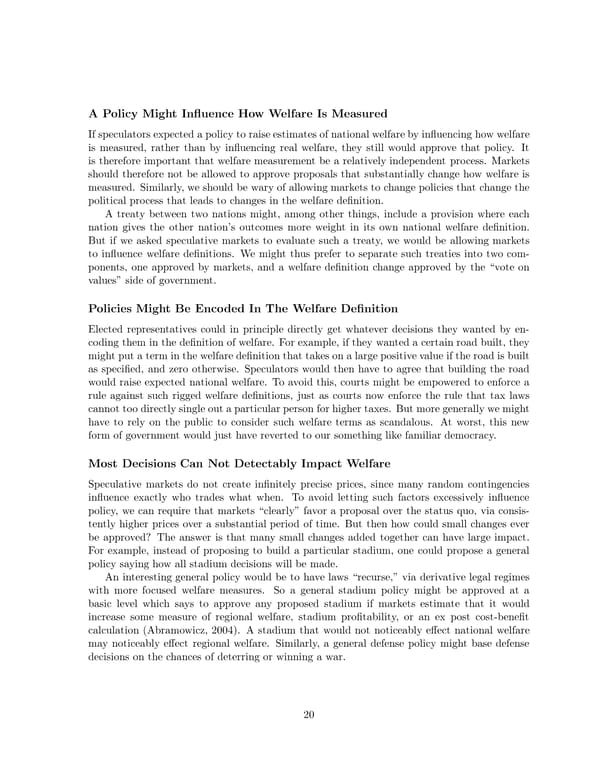APolicy Might Influence How Welfare Is Measured If speculators expected a policy to raise estimates of national welfare by influencing how welfare is measured, rather than by influencing real welfare, they still would approve that policy. It is therefore important that welfare measurement be a relatively independent process. Markets should therefore not be allowed to approve proposals that substantially change how welfare is measured. Similarly, we should be wary of allowing markets to change policies that change the political process that leads to changes in the welfare definition. Atreaty between two nations might, among other things, include a provision where each nation gives the other nation’s outcomes more weight in its own national welfare definition. But if we asked speculative markets to evaluate such a treaty, we would be allowing markets to influence welfare definitions. We might thus prefer to separate such treaties into two com- ponents, one approved by markets, and a welfare definition change approved by the “vote on values” side of government. Policies Might Be Encoded In The Welfare Definition Elected representatives could in principle directly get whatever decisions they wanted by en- coding them in the definition of welfare. For example, if they wanted a certain road built, they might put a term in the welfare definition that takes on a large positive value if the road is built as specified, and zero otherwise. Speculators would then have to agree that building the road would raise expected national welfare. To avoid this, courts might be empowered to enforce a rule against such rigged welfare definitions, just as courts now enforce the rule that tax laws cannot too directly single out a particular person for higher taxes. But more generally we might have to rely on the public to consider such welfare terms as scandalous. At worst, this new form of government would just have reverted to our something like familiar democracy. Most Decisions Can Not Detectably Impact Welfare Speculative markets do not create infinitely precise prices, since many random contingencies influence exactly who trades what when. To avoid letting such factors excessively influence policy, we can require that markets “clearly” favor a proposal over the status quo, via consis- tently higher prices over a substantial period of time. But then how could small changes ever be approved? The answer is that many small changes added together can have large impact. For example, instead of proposing to build a particular stadium, one could propose a general policy saying how all stadium decisions will be made. An interesting general policy would be to have laws “recurse,” via derivative legal regimes with more focused welfare measures. So a general stadium policy might be approved at a basic level which says to approve any proposed stadium if markets estimate that it would increase some measure of regional welfare, stadium profitability, or an ex post cost-benefit calculation (Abramowicz, 2004). A stadium that would not noticeably effect national welfare may noticeably effect regional welfare. Similarly, a general defense policy might base defense decisions on the chances of deterring or winning a war. 20
 Shall We Vote on Values, But Bet on Beliefs? Page 21 Page 23
Shall We Vote on Values, But Bet on Beliefs? Page 21 Page 23